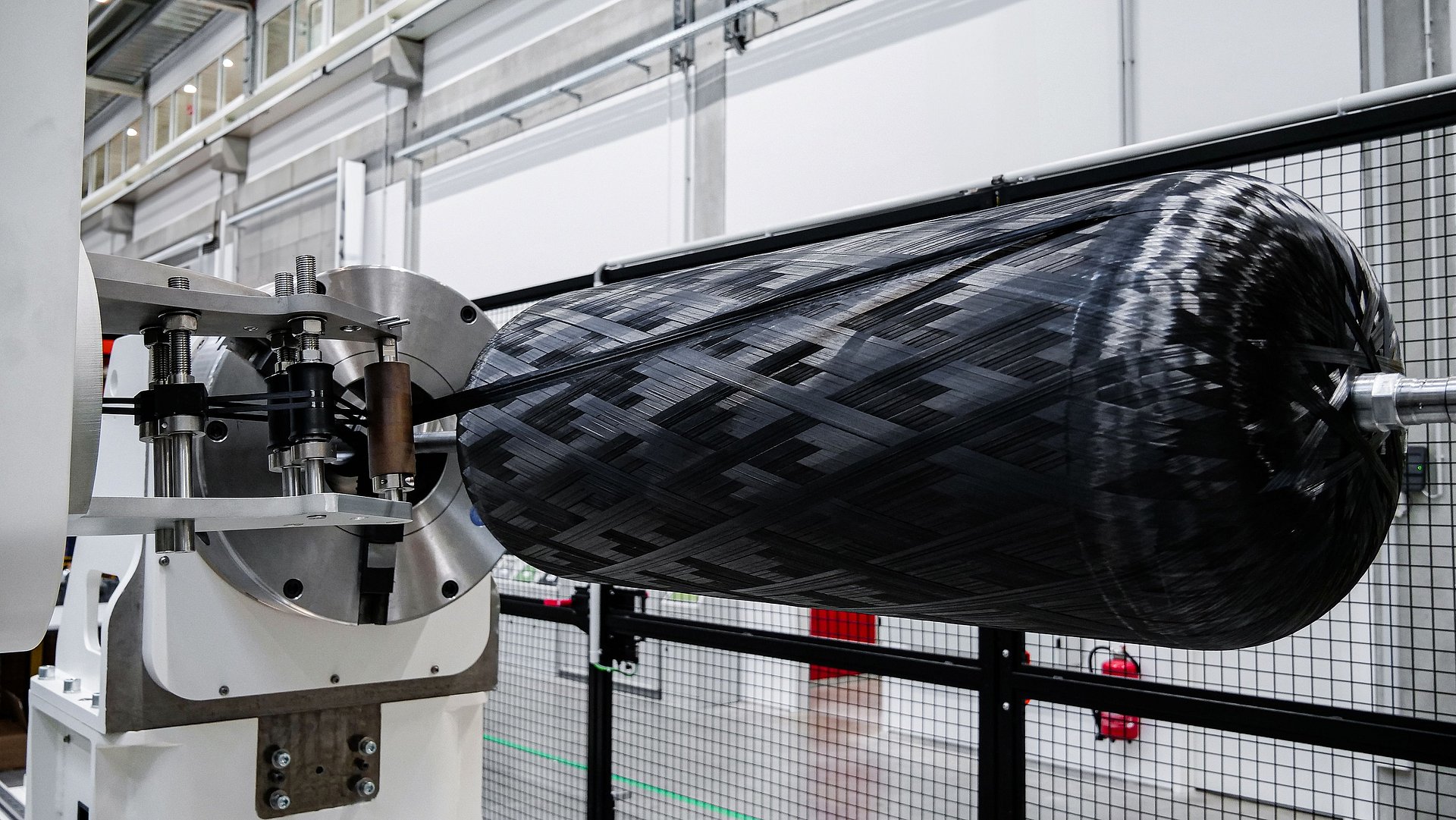Carbon fiber has become indispensable in high-performance industries such as automotive engineering and aerospace. It's lightweight, extremely durable, and can be shaped in almost any way. The start-up Blackwave, founded at the Technical University of Munich (TUM), specializes in this versatile composite material. What began with custom components for sports cars and aircraft has evolved into the development of high-pressure tanks for space applications.
 Christoph Krenn / Blackwave
Christoph Krenn / Blackwave As is so often the case in engineering, a small detail determines technological progress. In the case of rockets, it is the high-pressure tanks that are specially designed for the fuel systems. As rockets are designed to be as light as possible, they lose structural stability when the fuel tanks, known as primary tanks, are emptied. A trick is used to counteract this: alongside fuel combustion, noble gases are released from internal high-pressure tanks, known as secondary tanks. These gases fill the resulting empty space, maintaining structural integrity.
"It's like a can of soda - the ratio of wall thickness to diameter is actually quite similar in aerospace. As long as the can is filled with liquid and CO₂, I can stand on it without worry. But once it's empty, it immediately loses its structural integrity," explains Bastian Behrens, founder of Blackwave and TUM alumnus.
Lightweight, shapeable, and extremely durable
These high-pressure tanks must withstand extreme conditions, including operating pressures of up to 420 bar, exposure to aggressive fuels, and temperature fluctuations from minus 50 to plus 120 degrees Celsius. For decades, they were therefore made of heavy steel - and exclusively in spherical form.
Blackwave has developed a specialized solution: high-pressure tanks made from carbon fibers. Since 2018, the start-up has been producing tanks that offer multiple advantages. Carbon fibers are extremely strong and ideal for high-pressure applications. The material also doesn't chemically react with fuels. Additionally, carbon tanks are significantly lighter and more flexible. Unlike spherical steel tanks, bottle-shaped carbon tanks are easier to integrate into fuel systems.
Interest in these lightweight high-pressure tanks is high - renowned customers from Europe and the U.S. are already on board.
"The tank is the most elegant application we know today for carbon fibers. The stresses in tanks are purely tensile - and if carbon fibers excel at one thing, it's handling tensile stress," says Bastian Behrens.
From TUM student club to a company of its own
Bastian Behrens was fascinated by the glossy black material from an early age. Even in school, he laminated carbon parts for his motorcycle. While searching for a suitable degree program, he discovered the newly established TUM Chair of Carbon Composites -and moved from Aachen to Munich.
"I've always been passionate about race cars - especially the high-performance components. That's how I ended up at TUfast. However, I think airplanes are a bit cooler. And as a huge Star Wars and Star Trek fan - I know, an unusual combination - rockets and space were my ultimate goal. I consider it a great privilege to have now worked with Blackwave for all industries," Bastian Behrens emphasizes with passion.
His passion did not go unnoticed at TUM: Behrens joined the TUM Student Club TUfast and developed carbon parts for the racing team. International competitions and events led to his first contacts in the automotive industry. Using the expertise gained at TUfast, he began developing custom parts for the motorsports industry. The idea for Blackwave was born. This was followed by networking with the aerospace industry, and finally, the focus shifted to rocket components.
Networking, dedication, and start-up support
What began as a hobby became a calling during his studies. Behrens leveraged TUM's network to build connections and simultaneously optimized his manufacturing processes. He also took advantage of the university's start-up support. A start-up advisor from UnternehmerTUM provided the necessary expertise and support to build Blackwave.
Today, Blackwave has nearly 100 employees and sells its products worldwide. Some of these products have already earned "flight heritage"-meaning they've been successfully deployed in space.
The innovation ecosystem with TUM at its center is considered one of the most successful deeptech hubs in Europe. Its particular strengths are its strong, diverse network and extremely specific support. In initiatives and co-labs, start-ups work on innovations with established companies, experts, investors and administration. TUM and UnternehmerTUM, the Center for Innovation and Entrepreneurship , support start-up teams with programs that are precisely tailored to the individual phases of the start-up and the teams. The TUM Venture Labs offer direct access to cutting-edge research, technical infrastructure and market expertise in twelve fields of technology. Most recently, more than 100 companies were founded at TUM in one year and more than 1,100 start-up teams were supported by UnternehmerTUM and the Venture Labs. UnternehmerTUM, which invests with its own venture capital fund, has twice been voted Europe's best start-up center by the Financial Times.






